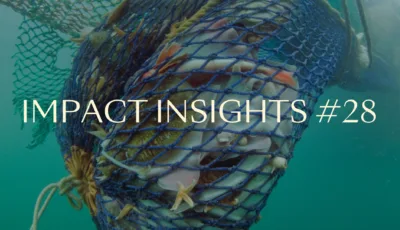Impact Insights #22

Ready to catch up on the latest in impact investing and sustainability? Here are the key industry updates you need to know.
■ New climate finance deal reached at COP29, the “finance COP”: too little, too late
At COP29 in Baku, nations agreed to mobilize $1.3 trillion annually by 2035 for climate action in developing countries. This includes $300 billion grants and low-interest loans from developed countries, and $1 trillion from private investors and new funding mechanisms (such as levies on fossil fuels, and frequent flyers). Critics claim this falls short in light of the urgency.The funding gap for the UN Sustainable Development Goals is estimated $3-4 trillion annually - triple the pledged amount. Worse, the timeline stretches to 2035, leaving the most vulnerable nations with no hope of support as climate-induced catastrophes intensify. The agreement replaces a failed 2009 commitment for $100 billion annually by 2020 - delayed by 2 years and deemed grossly insufficient.
■ The EU Deforestation regulation is delayed by one year
An area larger than the EU was lost to deforestation between 1990 and 2020. Yet, the long-awaited EU Deforestation Regulation (EUDR), aiming to ensure that products sold in Europe from cattle, cocoa, coffee, palm oil, rubber, soy and wood do not contribute to deforestation, is now delayed by 12 months. This push-back is welcomed by various companies and countries (in Europe, Brazil, Indonesia, USA), as many would not be able to fully comply as of December 2025. In addition to three initial risk categories for countries, a “no risk” category for countries with stable or increasing forest area development has been proposed, which could diminish disclosure requirements. Though the looming 2024 deadline had successfully managed to create an action momentum for large players to eliminate deforestation from their supply chain, the voted delay could weaken the regulation’s intended effects.
■ UN global treaty on limiting plastic production fails due to large producers and lobbyists
The sheer extent to which we use plastic today has resulted in unfathomable quantities being burned or dumped, endangering simultaneously nature, climate, and human health. UN talks were held in Busan this November to create a global treaty to halt and reverse the projected increase in plastic production and pollution, to end plastic pollution by 2040. However, without binding obligations from member states to limit first and foremost the production of plastic, such a treaty is at risk to be a failure. The succeeding rounds of talks have been heavily stalled by large fossil fuel producers such China, Russia and Saudi Arabia, also backed by fossil fuel industry lobbyists. Instead of cutting the problem at the source, these advocated instead in favour for re-use and recycling. Countries eventually failed to reach an agreement, and talks will resume at a later date.
■ New EU regulation for increased transparency and consistency on ESG ratings
Many investors do not trust ESG ratings due to the lack of comparability they offer, and whether they are able to trully identify sustainability champions. Morningstar has for instance identified Nike and Yum China as part of the top 100 most sustainable companies to own in 2024. The Council of the European Union recently adopted a new regulation on ESG ratings - a similar mechanism is taking place in the UK. This new regulation aims at making rating activities in the EU more consistent, transparent and comparable in order to boost investors’ confidence in financial products. More specifically, this regulation requires ESG rating providers in the European Union to be authorized and supervised by the European Securities and Markets Authority (ESMA), as well as to comply with strict transparency standards regarding methodologies and sources used. ESG rating providers outside the EU will need to be endorsed.
■ While consumers spent $74.4 billion worldwide on Black Friday this year, contestary initiatives have bloomed
Shoppers globally spent a record-breaking $75 billion during Black Friday in November ($5 billion more than last year) - primarily on new pieces of clothing. Product manufacturing, deliveries, excess packaging, and product returns take a high toll on the environment. The retail sector accounts for 25% of the world’s carbon emissions annually, causes uncontrolled pollution and puts a strain on resources such as water. Blatant overconsumerism on the occasion of Black Friday has however triggered momentum for various contestary initiatives condemning consumerism, and promoting concepts such as circularity and degrowth. For instance, upcycled looks from curtains and tablecloth could be observed on catwalks in Nairobi. In Ireland, the first-ever national, large-scale alternative Black Friday campaign was launched and put forward the motos “Less Buying, More Being” as well as “Less Shopping Sprees, More Native Trees”. FREITAG stores all over the world have closed their online and offline sales operations and created swap spaces whereby existing customers can exchange products from the brand.


